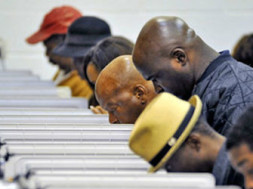
AIDS Drugs Offer Major Breakthrough in Fight Against Spread of HIV/AIDS But Cultural Determinants Still Crucial Within the Black Community

While the onset of PrEP is great news, we must still continue to examine and address co-factors that contribute to the staying power of HIV and AIDS among diverse African Americans.
Over three decades, while some in the Black HIV field may have been well-intended; most accepted approaches to preventing the spread of HIV have failed, and could only fail, partially due to the fact that Black AIDS institutions have typically focused on HIV or AIDS alone, and not the social determinants in which HIV risk taking are the symptoms of, and not the cause of HIV.
For example, self-concept challenges (which are still a problem among African American youth and former youth,) can compromise sex related impulse control capacity. One has to first value self in order to value protecting oneself and mastering impulse control to sexually protect from HIV (and other sex related diseases). Being at risk for HIV, especially now when there is increased HIV education, is often an indicator of preexisting, unaddressed issues that should have been addressed as part of a Black HIV prevention strategy – for real change to take effect.
Many Black males (particularly men who have sex with men) are apprehensive to voluntarily seek prevention services from traditional health systems. A number of Black males are concerned about abusive, or anti-homosexual or racist attitudes, and/or feeling judged or vulnerable in these settings. This creates access challenges that the arrival of PrEP will not resolve.
Self-esteem struggles, disproportionate under or unemployment among diverse Black makes, or a lack of Black cultural literacy, affirmation or competence in health care systems, will not be dissolved by the availability of PrEP. We must still work on these issues.
PrEP could be a powerful addition to an HIV prevention toolbox. Yet, co-factors leading to Black males being at top of the health disparity, HIV and morbidity lists in America have to be engaged.
For African Americans, PrEP, along with The Critical Thinking and Cultural Affirmation (CTCA) prevention strategy, could be a powerful arsenal against HIV and AIDS. CTCA,which is supported by a grant from The Center for Disease Control and Prevention (CDC), is a culturally informed preventive health strategy that addresses positive mental, sexual and community health, encouraging self-actualization, cultural empowerment and responsibility.
We would also need to look at access and affordability issues. To benefit from PrEP, people have to be able to afford it or be willing to access where it is administered. Black males – regardless of sexuality – still need to feel comfortable in seeking HIV related services. On the other hand, because women tend to access health systems more frequently than men, PrEP could greatly increase their capacity to self-protect from the HIV virus. This is powerful news.
It is also important to a reconfigure the traditional Black HIV prevention paradigm to fundamentally resolve and best PrEPare to resolve this epidemic.
About Cleo Manago
Cleo Manago is the CEO and founder of theAmASSI Centers for Wellness, Education and Culture (AmASSI). Cleo Manago is also the founder of Black Men’s Xchange (BMX) (http://www.bmxnational.com), the nation’s oldest and largest community-based movement devoted to cultural affirmation and critical consciousness among same gender loving (SGL) and bisexual African-descended males.
Manago is the creator of the strategy and practice entitled Critical Thinking and Cultural Affirmation (CTCA), a prevention model applied by the AmASSI Center in Los Angeles. The Center for Disease Control and Prevention (CDC), who also coordinated the second PrEP study, acknowledged the validity of the CTCA by granting the Research Foundation of The City University of New York, on behalf of Hunter College, two million dollars for evaluating Manago’s locally-developed risk reduction and prevention intervention for African-American males at HIV sexual risk.







